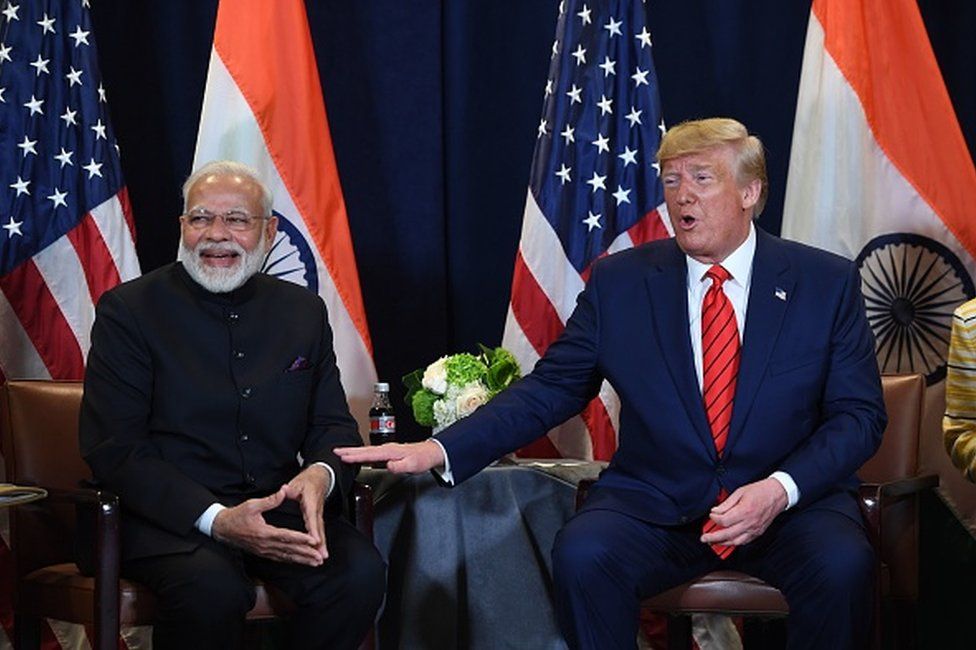What will Trump's visit do for US-India ties?
- Published

US President Donald Trump will begin his maiden trip to India on Monday, becoming the seventh American president to visit the country. Rudra Chaudhuri, who writes about diplomacy and security, explains the significance of the trip.
Mr Trump's two-day visit is designed to partially tickle his vanity, but, as importantly, it is to boost his chances of returning to office in the 2020 US general election.
He will visit three cities in India: the national capital, Delhi; Agra, where he will see the Taj Mahal; and Ahmedabad, the main city in the western state of Gujarat, where he is expected to address an audience of more than 100,000 people in an event aptly called "Namaste Trump".
This is an unmistakeable public diplomacy response to the "Howdy, Modi!" extravaganza in Houston last year, where Indian Prime Minister Narendra Modi and Mr Trump addressed an audience of 50,000 Indians living in the US.
But these visits are not just about theatrics and atmospherics. They are also about forcing a change in American leaders' general approach to India.
In this case, it's about convincing Mr Trump of the imperative of India, while helping him with the 2.4 million-strong Indian-American voter base in the US.
And there is at least one reason to appeal to his ego: stronger, strategic ties.
It's unlikely that a much debated but slim trade agreement between the US and India will be inked during this visit.
Disagreements over the price of apples, walnuts, and medical devices; the US's demands for greater access to India's dairy, poultry and e-commerce market; and ongoing discussions over lowering Indian tariffs on American-made Harley Davidson motorcycles, remain unresolved.
And speculation about whether or not Robert Lighthizer, the uncompromising US Trade Representative, will skip the trip suggests that a deal is off the table, at least for the time being.
In Trump speak, there is no "deal" for the dealmaker.
Trade between the US and India grew from $66bn (£51bn) in 2008 to $142.6bn in 2018. In part, trade grew as a result of strengthening strategic ties at a time when India's GDP was growing at more than 7-8% every year.
But the sharp drop in India's growth figures (an estimated 5% in 2019-2020), the introduction of increasingly protectionist economic policies, coupled with Mr Trump's fixation on balancing a trade deficit that currently favours India, has exhausted the scope of the relationship between the two countries.
In these circumstances, it will be incumbent on Mr Modi's government to woo Mr Trump in a manner that will side-step the US President's fixation with trade deals, focusing his attention on the strategic potential in the US-India relationship.
India is, after all, the largest open data market in the universe. Per capita, more data is consumed in India than anywhere else in the world. For American "big tech" firms, India provides a scale for their products unavailable in any other country. Despite current economic woes, this will continue to be the largest growing and relatively open consumer market for American products and business.
India is also a large arms importer. Defence trade is widely seen as the silver-lining in this relationship - US-India defence deals have ballooned in the past decade, from nearly zero in 2008 to a little more than $15bn in 2019.
A select range of defence-related agreements - including the Indian purchase of 24 multi-role helicopters manufactured by the American arms giant, Lockheed Martin - are likely to be completed during Mr Trump's time in India.
While officials fixate on more granular details around defence pacts and associated contracts, and as cities and a giant cricket stadium are being readied to dazzle Mr Trump, this unique relationship ought to be more than appealing to Mr Trump's love for pomp and ostentation.
This is a time of geopolitical disorder. The post-1945 architecture of global politics stands challenged: America's partial retrenchment from international commitments, evident in the withdrawal from hard-fought climate change agreements to undoing multilateral trade deals; China's trillion-dollar gamble through the Belt and Road initiative (BRI); the return of Russia; Brexit; and disunity in Europe in dealing with new technologies such as 5G. This requires the world's two largest and messiest democracies to return a degree of enthusiasm to wider concerns and challenges.
It can only be hoped that between dance performances in Ahmedabad and long walks up to the Taj, Mr Modi and Mr Trump find time to discuss the world as it is, and the real potential in the US-India relationship.
There is scope and a need for a serious discussion on establishing and strengthening international alliances to prevent and deal with the outbreak of pandemics, especially on the back of the Coronavirus outbreak. Disputes about the use of emerging technologies and the challenges to the cross-border flow of data will require much thinking about the creation of new international structures (such as a partnership of like-minded countries) or the renewal of older ones (through the G20 for instance) to address these new-age concerns.
Despite Mr Trump's addiction for trade and deals, and notwithstanding the need in India to dazzle him with concerts and performances, there is a genuine opportunity for two world leaders to find space for a conversation on how two outsized democracies can truly shape the 21st Century.
Modi to Trump: "My honour to introduce you to my family"
Rudra Chaudhuri is the director of Carnegie India, a think tank, and author of Forged in Crisis: India and the United States Since 1947.
- Published20 September 2019
- Published15 August 2019
- Published23 May 2019